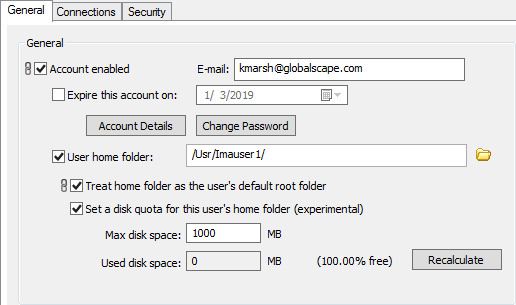Specifying a User Disk Quota
Disk space management is an important aspect of server administration. Setting quotas allows you to specify the maximum amount of disk space available to each user in their home folder. The quota is set in the Settings Template and/or for each user. Users do not have a specified disk quota by default.
-
You can enable and disable the disk quota options using the registry key described in KB#11429. That is, if you have no need to define a disk quota, you can hide those options in the interface. Disk quota options were removed from the administration interface in EFT v7.4.11 by default. The options are still enabled and visible if you have upgraded from a previous version.
-
In EFT v7.4.13 and later, calculation frequency and timeout period can be specified in the registry.
-
In a cluster, disk quota is specified on each node independently.
When enabled, the Max disk space setting on the Settings Template's General tab sets the maximum disk space that users can consume in their home folders. EFT administrator can assign a maximum disk space for each user's home folder. Obviously, uploading files increases used disk space and deleting files decreases this number. If the used disk space equals the maximum disk space, the user has to delete files before any more files can be uploaded.
Tip: Create a "User Quota Exceeded" Event Rule to let users know when they need to clean up their files to reduce their used disk space.
An administrator can use Windows Explorer to add or delete files in a user's home folder, and EFT will update the user's used disk space. Additions and deletions to a user's folder that are performed outside of EFT are not prohibited, even when the total file size exceeds the maximum disk space allowed. However, exceeding the user's used disk space will cause the user to be prohibited from uploading until the used disk space is less than the maximum disk space. This can also occur during parallel uploads from clients like CuteFTP, because EFT evaluates each request independently, not in aggregate, when determining whether the request exceeds the quota limit.
If users report that they are not able to upload files, check whether they have enough disk space available. If not, you or they will need to remove files from their home folder before they can upload any more files with EFT, or you might need to adjust their maximum disk space allowance.
-
In EFT v7.4.13 and later, disk quota is not calculated upon service start for all users with quotas. (This change improves performance during server startup.) Disk quota is calculated on user's login if re-baseline period expired, which becomes the "baseline" disk quota value.
-
Upon each upload/download, the user's disk quota value is incremented or decremented.
-
The resulting value is stored for that user or template, and it becomes the new baseline at each subsequent login.
-
Registry override DiskQuotaBaselineCalculationFrequencyInDays allows administrator to specify a re-baseline period in days.
-
The administrator can initiate a baseline re-calculation by clicking Recalculate on the user account's General tab.
To set users' disk quotas
-
In the administration interface, connect to EFT and click the Server tab.
-
On the Server tab, click the Settings Template or user you want to configure.
-
In the right pane, click the General tab.
-
Select the Set a disk quota for this user's default root folder check box and type the maximum number of megabytes (MB) the user may store in the home folder. The amount of disk quota currently in use appears as a percentage to the right of the Used disk space box.
If you attempt to disable this feature on a high security-enabled Site, a message appears to warn you that this setting violates the PCI DSS, and allows you to continue with reason, or disable the feature.
-
Disk quota is calculated upon user login. Press Recalulate at any time to view an updated disk quota.
-
Click Apply to save the changes on EFT.
